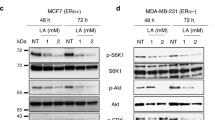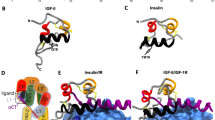Abstract
The potent mitogenic activity of insulin-like growth factor I (IGF-I) on breast epithelium is inhibited by retinoic acid in oestrogen receptor-positive (ER+) breast cancer cell lines. We studied and compared the effects of N-(4-hydroxyphenyl)-retinamide (4-HPR) in terms of growth inhibition and modulation of the IGF-I system in ER+ (MCF-7) and oestrogen receptor-negative (ER-) (MDA-MB231) breast cancer cell lines. Treatment with 1-10 microM 4-HPR for up to 96 h induced a dose- and time-dependent inhibition of proliferation in both breast cancer cell lines. Induction of apoptosis was much more evident in MCF-7 than in MDA-MB231 cells (30-40% compared with 0-5% respectively at 5 microM for 48 h). Exogenous human recombinant IGF-I (hr-IGF-I)-stimulated cell proliferation was abolished by 1 microM 4-HPR in MCF-7 cells. Immunoreactive IGF-I-like protein concentration in conditioned medium was reduced by 38% in MCF-7 and by 90% in MDA-MB231 cell lines following treatment for 48 h with 5 microM 4-HPR. Western ligand blot analysis showed a reduction of IGF-binding protein 4 (BP4) and BP5 by 67% and 87%, respectively, in MCF-7, whereas IGF-BP4 and -BP1 were reduced by approximately 20% in MDA-MB231 cells. Exposure to 5 microM 4-HPR for 48 h inhibited [125I]IGF-I binding and Scatchard analysis revealed a decrease of more than 50% in maximum binding capacity (Bmax) and a reduced receptor number/cell in both cancer cell lines. Steady-state type I IGF-receptor mRNA levels were reduced by approximately 30% in both tumour cell lines. We conclude that 4-HPR induces a significant down-regulation of the IGF-I system in both ER+ (MCF-7) and ER- (MDA-MB231) breast cancer cell lines. These findings suggest that, in our model, interference with the ER signalling pathway is not the only mechanism of breast cancer growth inhibition by 4-HPR.
This is a preview of subscription content, access via your institution
Access options
Subscribe to this journal
Receive 24 print issues and online access
$259.00 per year
only $10.79 per issue
Buy this article
- Purchase on Springer Link
- Instant access to full article PDF
Prices may be subject to local taxes which are calculated during checkout
Similar content being viewed by others

Author information
Authors and Affiliations
Rights and permissions
About this article
Cite this article
Favoni, R., de Cupis, A., Bruno, S. et al. Modulation of the insulin-like growth factor-I system by N-(4-hydroxyphenyl)-retinamide in human breast cancer cell lines. Br J Cancer 77, 2138–2147 (1998). https://doi.org/10.1038/bjc.1998.358
Issue Date:
DOI: https://doi.org/10.1038/bjc.1998.358
This article is cited by
-
Phase III double-blind, placebo-controlled, prospective randomized trial of adjuvant tamoxifen vs. tamoxifen and fenretinide in postmenopausal women with positive receptors (EB193): an intergroup trial coordinated by the Eastern Cooperative Oncology Group
Medical Oncology (2011)
-
Targeting cyclin D1, a downstream effector of INI1/hSNF5, in rhabdoid tumors
Oncogene (2006)
-
Activation of p53, inhibition of telomerase activity and induction of estrogen receptor beta are associated with the anti-growth effects of combination of ovarian hormones and retinoids in immortalized human mammary epithelial cells
Cancer Cell International (2005)
-
Fenretinide and cancer prevention
Current Oncology Reports (2000)


